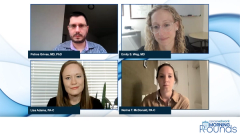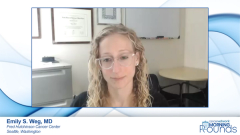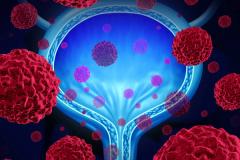
Advanced Bladder Cancer: Future Directions in Care
Closing out their panel on advanced bladder cancer management, key opinion leaders share their excitement for future evolutions within the treatment landscape.
Episodes in this series

Transcript:
Petros Grivas, MD, PhD: Maybe a couple of more questions as we’re closing our fantastic discussion. This is mainly about communication with patients. Nerina, we have this portal where patients may communicate with us. Of course, they’re calling the nursing line. They sometimes send us a message through the portal or call and email. [Do you have] any comments about best practices for communication to and from the patient?
Nerina T. McDonald, PA-C: I like the portal for the most part because it provides the patient with written instructions and information that they can reference later on. I think it just requires a lot of coaching or education for patients about when the portal is appropriate and when it isn’t. You don’t want a patient to write in over the weekend that they’re having a severe blistering rash and then potentially that doesn’t get looked at again until Monday morning when the clinic reopens. I think just having a lot of discussions with the patients about when to [make] a phone call, when to [present] to the emergency [department] immediately, and when to [use] the portal to ask questions or to try and get more information or handouts that they can reference.
Petros Grivas, MD, PhD: Absolutely. I think the information is always so useful. And you’re right. We try to get to the patient in a timely manner. I think it’s key to have the opportunity to give them handouts, printouts, or even send them electronically through MyChart messages. Sometimes phone calls and in-person visits are key to examining the patient. Sometimes you can learn so much by examining them and asking them questions…. I think this has been a wonderful discussion. I think that the field has changed so much and I think providers like you make a difference. The key take-home message is that we need a multidisciplinary approach. I think there is a huge need, of course, to work together between community practices and academic practices. There’s so much to learn from that interaction and this communication. I will go around the room very quickly. Lisa, I’ll start with you. Maybe you can talk about the community-academic practice interaction and any other take-home message that you have.
Lisa Adams, PA-C: We’re very fortunate to be plugged into our sister academic campus at [the University of Colorado Anschutz Medical Campus in Aurora]. So when we do have these complex cases of advanced bladder cancer, we definitely refer to our subspecialists in the academic setting and appreciate their multidisciplinary review of the cases. And then they will often refer back to us for management of their [cases] locally after they’ve given those opinions. That nice flow of communication and being accessible, that is huge. And then, even when we’re seeing more rural patients, inviting their local physicians to join our tumor boards virtually can be a great option. Providing cell phone numbers or emails and just letting other providers know we’re accessible, because ultimately we’re all pulling together to take the very best care of these patients.
Petros Grivas, MD, PhD: Fantastic. And this interaction interplay communication, again, is optimal. Sometimes getting on the phone can be much more productive than emails back and forth. Nerina, any take-home points before we go? And then I will ask Emily for the last comment.
Nerina T. McDonald, PA-C: I think a lot of this is a credit to you, Dr Grivas, because you have done so much outreach in the community setting. You are educating other providers about what clinical trials are available at our institution so that if a patient does look eligible or is progressing on standard-of-care regimens, their community oncologists—even for patients coming from Alaska, Montana—know where to contact us and get patients enrolled in a trial that could potentially work really well for them.
Petros Grivas, MD, PhD: Thank you, Nerina. You’re kind. It’s definitely a dialogue back and forth with colleagues in the community. It’s fantastic to partner with them, as you and Lisa mentioned. Emily, you take the last comment of this wonderful dialogue.
Emily S. Weg, MD: This has been a really wonderful discussion. I enjoyed participating. Thank you, Petros, for moderating it so wonderfully. And it was wonderful to have this conversation with all the colleagues here. I think the take- home message is that we just cannot underestimate the importance of communication. Communication with other sites of practice, communication with our patients, and communication with our team. I always say this to my patients too. There’s no such thing as overcommunication. When in doubt, always reach out.
Petros Grivas, MD, PhD: Absolutely. I totally echo that.I remember I was talking with a colleague of mine the other day and I said, “If we pick up the phone and if there is a problem, we can solve it much faster.” A virtual call or in-person visit sometimes can be faster than many emails back and forth. Of course, it has to be adjusted in the context, but communication is key. And I think the patients appreciate when we are a team, a unique team, a cohesive team within an institution, and of course with colleagues outside the institution. And on that note, I would like to thank all of you. What a fantastic discussion. We covered so many aspects of care.I would like to thank the audience as well for joining this live discussion on bladder cancer, brought to you by the CancerNetwork®. We hope you found this interactive discussion informative, helpful, and beneficial to your clinical practice. Thank you so much. Have a wonderful day, everybody.
Transcript edited for clarity.
Newsletter
Stay up to date on recent advances in the multidisciplinary approach to cancer.







































